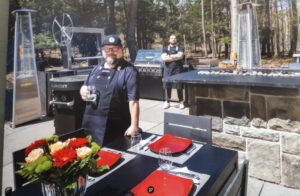January 15: I have avoided writing this piece for some time because, frankly, it’s painful to consider. But I’ve come to understand that I need to reflect on what happened and what it means for me, and possibly, for you.
It was a warm and pleasant day in December, and I had decided to go shopping at St. Clair and Yonge. That accomplished, I was heading north on Yonge, admiring the store fronts and life on the street. I was not really paying attention to my surroundings but heard a thump that I soon realized was a man who had fallen on the sidewalk. He was lying a short distance ahead of me next to a tree planter.
As I got closer, I could see that he was moving slightly. He was dressed in bulky dark clothing that was too warm for the weather. Given his clothing, his positioning and behaviors, I put two and two together and concluded that this was a street person who was likely drunk and had fallen off his perch on the tree planter. I got closer and determined that he was awake, he was breathing, and he was apparently quite intoxicated.
And then I left him lying there and walked on.
I looked up to see a man standing on the sidewalk talking on his cell phone. He was looking south past me to where the man lay on then sidewalk. He seemed quite anxious. Within a couple of minutes, two police cars arrived with full lights and sirens. The officers approached the man with the phone and then headed south to deal with the fallen man. I didn’t wait around to see what transpired.
On thinking about this scene some more, I was shocked at my behaviour. I began thinking about my reaction to the man on the ground. After a very cursory examination, I had determined that he was “a street person”, a drunk, and I left him to fend for himself. For some reason I walked on when I should have stopped and made sure that he got the help he needed. If it was an 80-year-old woman lying on the ground, there would have been no debate about what I would have done. The police would not have been called.
I believe that I have compassion and understanding for those who are less fortunate than me. I spend time as a volunteer at Out of the Cold, and I am comfortable being around most of the street people there. It should have been ingrained in my character to help this person, and yet, I walked on.
The man with the cell phone did deal with it, and yet he clearly felt so concerned about the situation that he called the police. The intoxicated man was so dangerous that he needed to be dealt with by force.
On reflection, perhaps these differing responses represent our societal reaction to the homeless. On the one hand, there’s the feeling that the homeless will somehow look after themselves. Sure, they are injured and sick, but they deserve what they got and should be left to fend for themselves. At the other extreme is the view that they are dangerous and threatening enough that a police response is needed.
I believe that there is an urgent need to deal with those less fortunate than ourselves as they struggle with homelessness, addictions and mental health challenges. These are real people with real lives who have fallen on hard times not of their choosing. There is a real financial cost to society in ignoring their needs, and an impact our collective psyche as we navigate homeless encampments and needles in the gutters of our streets.
Many of us have come to believe that those left behind are of little consequence and somehow deserve their life. Every man for himself and the devil take the hindmost. We have become hardened to the fate of those on the margins: the homeless, the mental health survivors, the addicted. Yet they are among us and deserve compassion and support as they struggle mightily through their day.
We can no longer afford to ignore the problem and simply walk on.





 He also spoke of waiting in line to take off on a night mission. The first aircraft in line would be given a green light, signifying that it was clear to take off. When they had cleared the field, the next in line would be given the green and off you would go. On this particular night, one of the aircraft ahead of Dad’s plane had attempted takeoff and collided with trees near the end of the runway. There was a massive explosion (being fully fueled and loaded with bombs), and then a brief pause before the next plane was given the green light.
He also spoke of waiting in line to take off on a night mission. The first aircraft in line would be given a green light, signifying that it was clear to take off. When they had cleared the field, the next in line would be given the green and off you would go. On this particular night, one of the aircraft ahead of Dad’s plane had attempted takeoff and collided with trees near the end of the runway. There was a massive explosion (being fully fueled and loaded with bombs), and then a brief pause before the next plane was given the green light.

